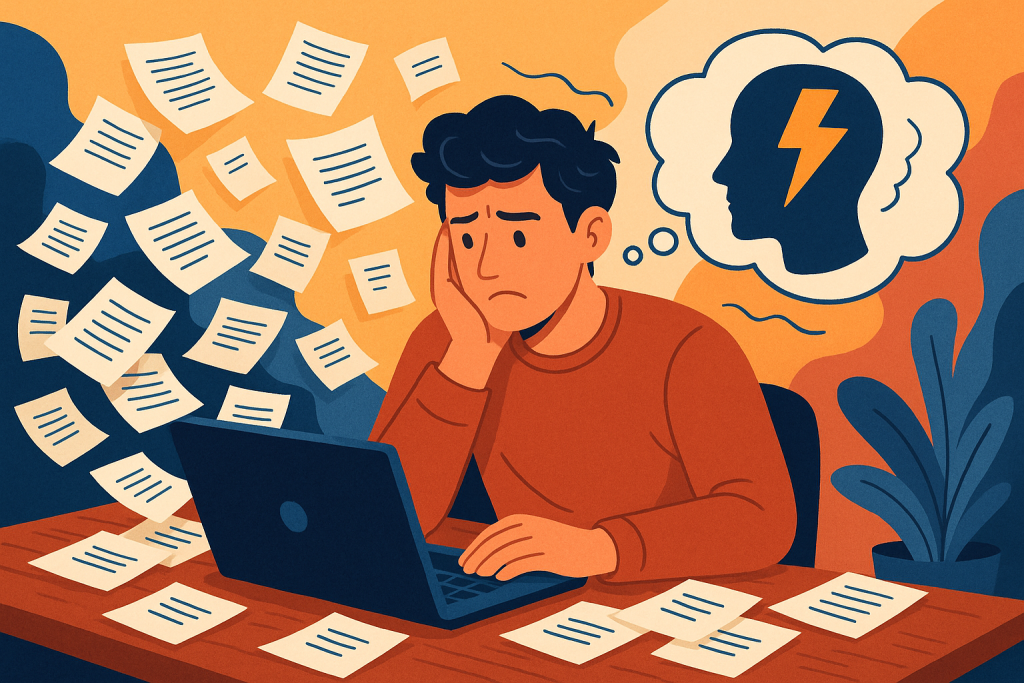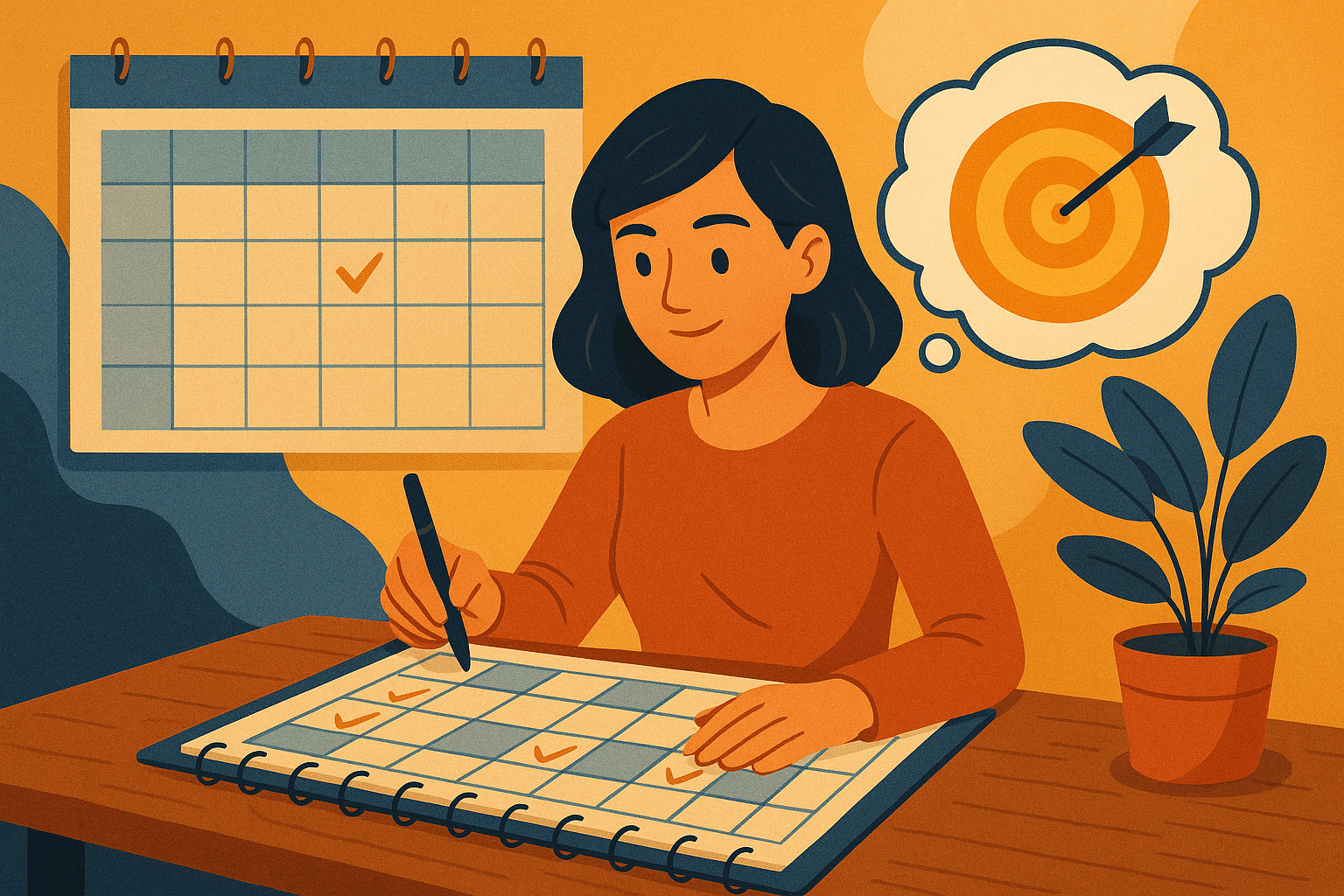In a world obsessed with speed and constant connectivity, the real danger isn’t a lack of information—it’s having too much. “Input overload” is becoming a mental health epidemic, quietly draining productivity, creativity, and insight from millions.

The Digital Glut: Too Much, Too Fast
We check our phones over 100 times a day. Emails, Slack messages, Zoom calls, news alerts, podcasts, TikToks, newsletters—it’s nonstop. According to a 2023 Microsoft study, the average employee now processes more digital information in a single day than a 1950s worker did in an entire month (Microsoft, 2023). That kind of input isn’t just excessive—it’s paralyzing.
What Is Input Overload?
Input overload occurs when the brain receives more information than it can effectively process. It leads to cognitive fatigue, impaired decision-making, and—ironically—a decrease in learning and insight. While it may feel like multitasking makes us more efficient, neuroscience says otherwise.
According to Dr. Daniel Levitin, a cognitive neuroscientist, “When we attempt to juggle multiple streams of information, we actually waste more time and make more errors” (Levitin 2015). Your brain switches between tasks rather than doing them simultaneously, costing time and clarity.
Why Insight Needs Mental Space
Insight doesn’t thrive in chaos. It requires moments of stillness—what psychologists call “default mode” or “mind-wandering mode.” When we let our minds rest, new connections emerge. This is when real creativity happens.
A 2022 study published in Nature Communications confirmed that periods of low stimulation are critical for creative problem-solving (Benedek et al., 2022). Yet most people never reach this mental state during the day because of constant digital noise.
The Rise of Digital Burnout
A growing number of professionals report feeling mentally exhausted—not because of overwork, but because of overconsumption. A Deloitte report from 2023 found that 59% of remote workers say they are overwhelmed by the volume of digital communication alone (Deloitte, 2023). That’s input overload at work, reducing our capacity for meaningful thought.
Consequences of Input Overload
Here’s how input overload sabotages your insight and performance:
- Decision fatigue: More options = poorer decisions.
- Shallow thinking: You skim everything and absorb nothing.
- Reduced memory: Excess input reduces retention.
- Anxiety: A mind flooded with stimuli can’t settle.
How to Fight Input Overload and Reclaim Insight
Here are science-backed strategies to fight back and reclaim your mental clarity:
1. Set “No-Input” Zones
Block out at least 1 hour per day for zero digital input—no emails, no news, no scrolling. Just uninterrupted time to think, walk, write, or reflect.
2. Use the Rule of 3
Limit your daily input sources to just three: one news outlet, one email check-in, and one primary messaging app. This simple rule cuts the clutter and restores control.
3. Practice Digital Fasting
Consider one day a week (or even just Sunday mornings) without any screens. It helps your brain reset and boosts creative insight over time.
4. Prioritize Deep Work
Carve out blocks of time for undistracted work. Silence notifications, close tabs, and immerse yourself in a single task. Cal Newport’s work confirms this deepens focus and improves output (Newport, 2016).
5. Create a Second Brain
Use external tools like Notion or Evernote to capture information, so your brain doesn’t have to store it all. This frees mental space for reflection and insight.
The Business Case for Reducing Input
Companies are waking up to this reality. Tech firms like Google and Shopify have begun implementing “no meeting days” and async work models to reduce overload. Leaders understand that fewer inputs mean deeper outputs. Insight can’t be scaled—but it can be nurtured.
Insight Isn’t Dead—It’s Drowning
We’re not less capable of insight—we’re just too busy scrolling to notice it. To thrive in today’s world, we must do less to think more. Input overload is not just a personal issue—it’s an existential threat to innovation, well-being, and long-term growth.
References
Harvard Business Review (2023) The Busier You Are, the More You Need Quiet Time. Available at: https://hbr.org/2017/03/the-busier-you-are-the-more-you-need-quiet-time (Accessed: 20 June 2025).
Psychology Today (2020) Is Information Overload Hurting Mental Health? Available at: https://www.psychologytoday.com/us/blog/denying-the-grave/202006/is-information-overload-hurting-mental-health (Accessed: 20 June 2025).
Mindful.org (2017) The Science of Taming the Wandering Mind. Available at: https://www.mindful.org/taming-the-wandering-mind/ (Accessed: 20 June 2025).






